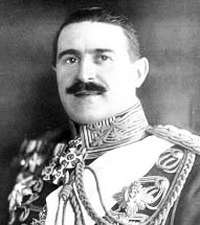Petar Živković
| Petar Živković | |
|---|---|
 | |
| 11th Prime Minister of Yugoslavia | |
|
In office 7 January 1929 – 4 April 1932 | |
| Monarch | Alexander I |
| Preceded by | Anton Korošec |
| Succeeded by | Vojislav Marinković |
| Minister of the Interior | |
|
In office 7 January 1929 – 5 January 1932 | |
| Prime Minister | himself |
| Preceded by | Anton Korošec |
| Succeeded by | Milan Srškić |
| Minister of the Army, Navy and Air Force | |
|
In office 22 October 1934 – 7 March 1936 | |
| Prime Minister |
Nikola Uzunović (1934) Bogoljub Jevtić (1934-35) Milan Stojadinović (1935-36) |
| Preceded by | Milan Milovanović |
| Succeeded by | Ljubomir Marić |
| Minister without Portfolio | |
|
In office 1943–1943/45 | |
| Monarch | Peter II |
| Preceded by | None |
| Succeeded by | None |
| Personal details | |
| Born |
1 January 1879 Negotin, Serbia |
| Died |
3 February 1947 (aged 68) Paris, France |
| Nationality | Yugoslav |
| Political party |
Yugoslav Radical Peasants' Democracy Yugoslav National Party |
| Religion | Serbian Orthodox |
| Military service | |
| Allegiance | Yugoslavia |
| Service/branch | Royal Yugoslav Army |
| Years of service | 1903-1943 |
| Rank | General of the Army |
| Battles/wars | World War I |
Petar Živković (Cyrillic script: Петар Живковић; 1 January 1879 – 3 February 1947) was a Serbian soldier and political figure in Yugoslavia. He was Prime Minister of the Kingdom of Yugoslavia from 7 January 1929 until 4 April 1932.
Life
Petar Živković was born in Negotin, Principality of Serbia (present-day Bor District, Serbia) in 1879. A soldier at the Serbian court, he helped overthrow the Obrenović dynasty with the assassination of King Aleksandar Obrenović (11 June), which was orchestrated by colonel Dragutin Dimitrijević, the founder and leading member of the secret nationalist organization Black Hand. Živković later founded the secret organization White Hand in 1912, which served to counter the power of the Black Hand. In 1921, Alexander I of Yugoslavia appointed Živković commander of the Palace Guards, but he was briefly demoted due to accusations of a young guardsman that he tried to seduce the youth.[1] So in 1929 he was instead appointed Prime Minister as part of the 6 January Dictatorship. General Živković, who was set up as strong man by royal decree, was Bogoljub Jevtić's brother-in-law, the closest adviser to the head of State.
Živković held the office as a member of the Yugoslav Radical Peasants' Democracy (JRSD), which was soon the only legal party in Yugoslavia, due to his electoral "reforms." He resigned as prime minister in 1932, and shortly thereafter founded the Yugoslav National Party, becoming its president in 1936.
Meanwhile, Alexander I had been assassinated, in 1934; his cousin Pavle Karađorđević took office as regent for the 11-year-old Petar II. Upon Pavle's 1941 signing of the Tripartite Pact, Živković left Yugoslavia, ahead of the Nazi invasion (see Balkans Campaign). He became part of the Yugoslav government in exile.
In 1946 he was tried in absentia in Yugoslavia and sentenced to death. He remained in exile in France, dying in Paris in 1947, aged 68.
References
- ↑ In this reference in Serbian on Vesti Online
External links
- "Zivkovic, Petar." Encyclopædia Britannica Premium Service.
| Political offices | ||
|---|---|---|
| Preceded by Anton Korošec |
Prime Minister of Yugoslavia 1929–1932 |
Succeeded by Vojislav Marinković |
| New office | Minister without Portfolio 1943–1943/45 |
Abolished |
| Wikimedia Commons has media related to Petar Zivanic. |